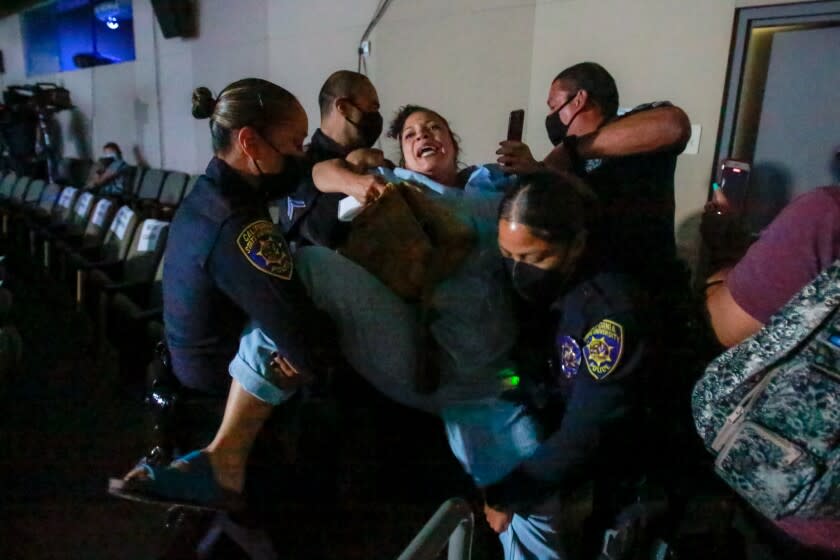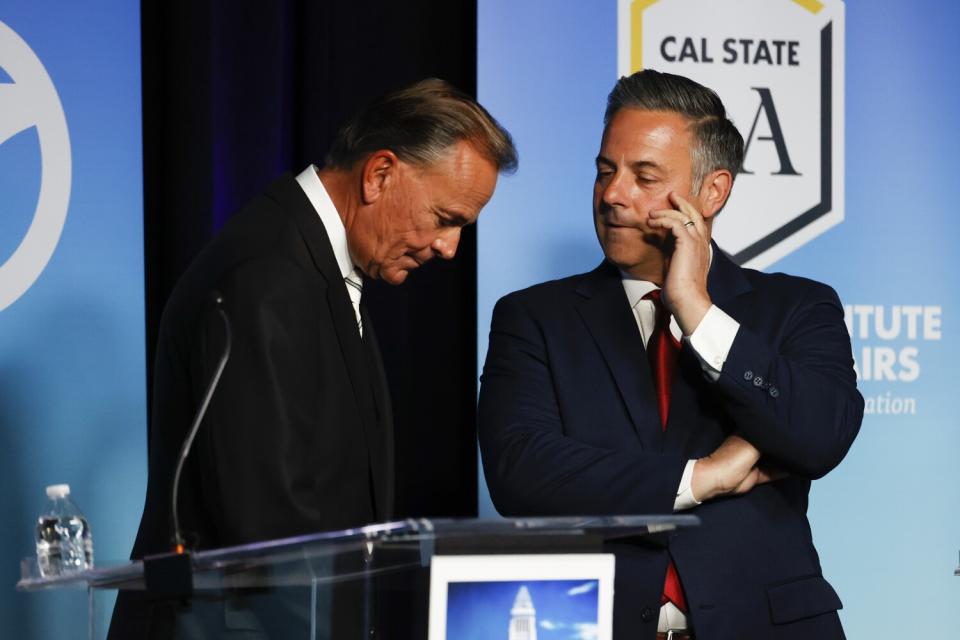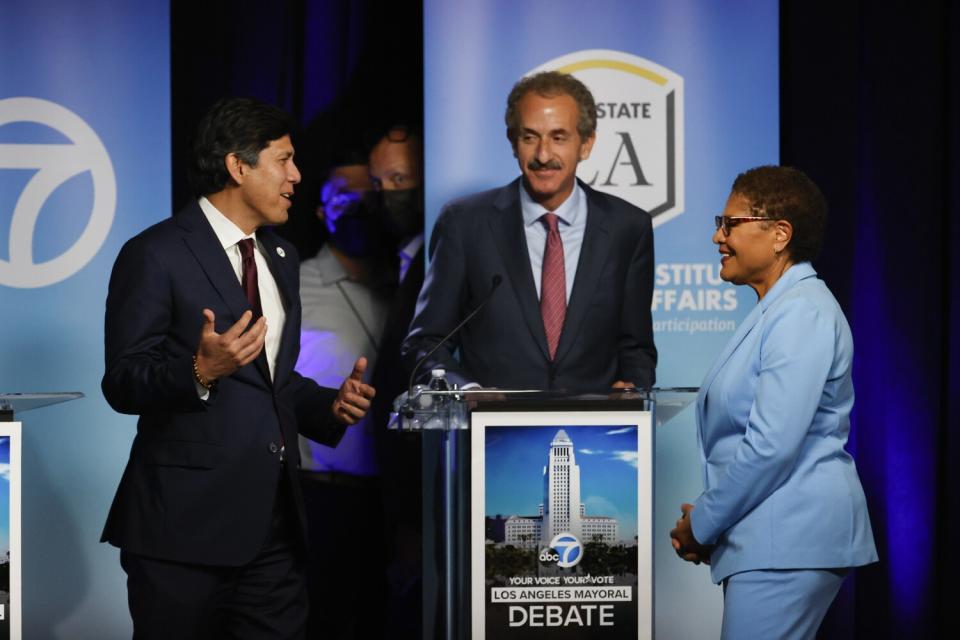After cops remove activists, L.A. mayor candidates take on homelessness — and one another

- Oops!Something went wrong.Please try again later.
- Oops!Something went wrong.Please try again later.
Sunday's mayoral debate began with a leader of Black Lives Matter-Los Angeles being forcibly removed from the auditorium by multiple campus police officers just before cameras started rolling and ended with the candidates sharing their favorite locations to visit in the city.
During the intervening 90 minutes, five of the leading candidates for Los Angeles mayor traded arguments and accusations over how to address crime, homelessness, climate change and other issues. At times, they appeared almost as frustrated as the voters of Los Angeles.
Rep. Karen Bass, City Councilman Joe Buscaino, real estate developer Rick Caruso, City Atty. Mike Feuer, and Councilman Kevin de León all argued at different points that the city is facing a crisis. Caruso sought to pin the blame on the other four.
"The tragedy down at City Hall -- the lack of humanity, the lack of compassion for the way people are living -- is literally 10 minutes from the offices of everyone to the left of me," he said. "And for some reason you've been driving the other way, not driving into that problem.”
The four other candidates onstage objected strongly to that message. Bass also issued a warning to the other candidates, saying they should be mindful about their messages about the city's problems.
“If you lead a campaign that says the city is going to hell in a handbasket and everything is awful in Los Angeles, then that just builds on the despair and the fear,” she said.
The debate, which was held at Cal State L.A. and aired on ABC 7, was hosted by the university's Pat Brown Institute for Public Affairs and the League of Women Voters of Greater Los Angeles.
Unlike a forum held the previous day, it went without live disruption from the activist groups that have dogged the major candidates in recent months. But there were protests preceding it and activists were forcibly removed from the audience minutes before the debate was set to begin.
Black Lives Matter-Los Angeles leader Melina Abdullah — a professor at Cal State L.A. and former chair of the school's Pan-African studies department — said she was carried out of the room by police officers for being at the ticketed event without a ticket. Videos shared on Twitter showed multiple police officers dragging Abdullah outside the auditorium.

Debates should be public, "especially at a public university," Abdullah said via text, noting that students, faculty and the public weren't allowed inside "a near-empty theater."
Admittance to the campus auditorium had been closely restricted, and several candidates not invited to participate — including Gina Viola, Alex Gruenenfelder, Craig Greiwe and Ramit Varma — protested outside before the debate.
In many ways, Sunday's event felt like a retread of the last debate to feature these five candidates, with criticism once again trained on Caruso, which in turn enabled him to receive extra debate time to respond and make his case.
Caruso, as he did in March, issued broad-brush attacks on the other four candidates, all of them elected officials, tying them to homelessness, rising crime and other ills. The candidates, in turn, defended the idea of public service and accused Caruso of trashing their profession.
“I don’t spend time disparaging people in office,” said Caruso — known for developing properties such as the Grove and the Americana at Brand, as well as his several years on the Department of Water and Power board and as president of the civilian Police Commission. “What I disparage is elected officials that don’t produce results.”
The four other candidates sharply pushed back on that argument, saying they have in fact produced results. Bass described her work in freeing up billions of dollars in federal relief during the COVID-19 pandemic.
Feuer, in turn, touted his work in cracking down on the proliferation of firearms and working to ensure that children with preexisting conditions obtain health insurance. Caruso, he said, "chose to build glitzy malls. I chose to fight for seniors and kids and families."
Buscaino and De León highlighted their work on air quality and the environment, and described their efforts to move people off the sidewalks and under a roof. De León has opened “tiny-home” villages and other interim housing in his Eastside district, while Buscaino has done the same in neighborhoods near the port.
"Rick, you say you support local elected officials who get the job done, who are results-driven," Buscaino said. "Well, I'm your candidate."
Polling conducted about a month ago showed Bass and Caruso in a dead heat well ahead of the rest of the pack, with 24% of likely voters backing Caruso and 23% supporting Bass.
De León, who had 6% support in the poll, was a distant third. Buscaino and Feuer polled even further behind at 1% and 2%, respectively. The debate offered all three men another opportunity to try to distinguish themselves with voters and possibly break out from the pack with just a little over a month to go before the June 7 primary.
De León's debate rhetoric was particularly sharp: At one point he lashed out at Caruso, calling him a "consummate insider" who has been a politician all along.
During another memorable moment, the councilman — who is the son of a Guatemalan immigrant and was the only Latino onstage — responded entirely in Spanish to a question about street vending.
"I'm running for mayor because I'm tired of seeing people like my mother left behind, an immigrant woman with a third-grade education who cared for us by caring for the very wealthy," De León said at another point.

Sunday’s debate became especially heated when the candidates were asked about the “broken windows” theory of policing — the idea that police officers should enforce minor crimes in a neighborhood to prevent more serious crimes from taking hold.
De León argued that Caruso, while serving on the Board of Police Commissioners, used that approach to criminalize homelessness.
"They put you in jail because you were poor or you were drug addicted,” De León said. “They never dealt with housing, they never built housing ... and that's why we have such a big, giant epicenter of homelessness in the city of L.A. They criminalized the homeless using the broken windows theory.”
"It's a grotesque lie, and you know that, Kevin," Caruso shot back. "And it's shameful to say things like that about the good work of the men and women at LAPD —"
De León interrupted: "I don't besmirch the members of the LAPD —"
"Yes, you just did," Caruso said, adding: “You're criticizing the men and women of LAPD who brought crime down 30%.”
Buscaino attempted to break in to offer his view, but ABC 7 anchor Marc Brown, the moderator, cut him short.
"Nobody's speaking out of turn," he said.
Toward the end of the debate, Feuer said the city was on the verge of having its mayoral race outcome decided by money, rather than merit or values.
"Imagine Mr. Caruso as a candidate without the money. Would that be a viable candidacy?" Feuer asked.
Campaign finance disclosures show that Caruso has spent more than $23 million since entering the race in early February — an unprecedented sum that is more than four times what the other candidates have spent combined. Caruso has poured $22.5 million of his own money into his mayoral bid.
When the debate wrapped up, the five candidates were also asked to name their favorite places to visit in Los Angeles. Caruso and Bass said the beach; Buscaino mentioned the Korean Friendship Bell in San Pedro; and De León cited a state park in Chinatown. Feuer chose both City Hall and the Venice boardwalk.
This story originally appeared in Los Angeles Times.

